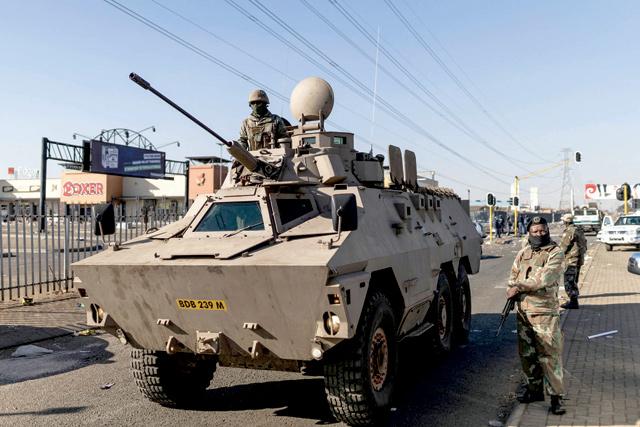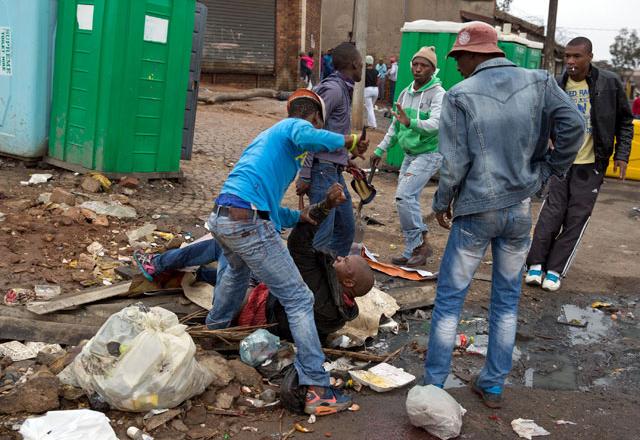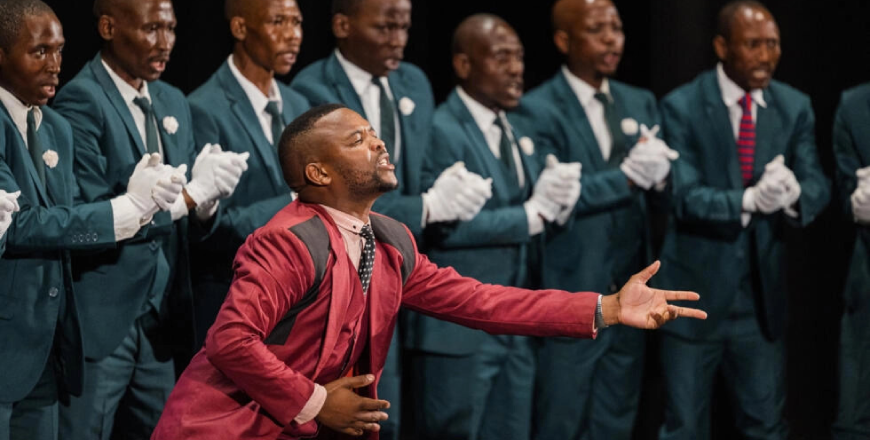You are here
South Africa unrest prompts fears of food and fuel shortages
By AFP - Jul 15,2021 - Last updated at Jul 15,2021

Members of the South Africa Defence Force stand guard with an armoured vehicle outside the Chris Hanni Mall in Vosloorus, on the northern outskirts of Johannesburg, on Wednesday (AFP photo)
JOHANNESBURG — Unrest raged in South Africa on Wednesday for the sixth day running, stoking fears of food and fuel shortages as disruption to farming, manufacturing and oil refining began to bite.
Seventy-two people have died and more than 1,200 people have been arrested, according to official figures, since former president Jacob Zuma began a 15-month jail term, sparking protests that swiftly turned violent.
Looting has hit supply chains and transport links especially in the southeastern province of KwaZulu-Natal, sending a shockwave to goods and services around parts of the country.
State-owned logistics operator, Transnet, on Wednesday declared a "force majeure", an emergency beyond its control, on a key rail line that links Johannesburg to the coast because the "unrest and subsequent closure of roads has meant employees are not able to report for duty".
In the port city of Durban, people started queueing outside food stores and at fuel stations as early as 4am (0200 GMT) when the COVID night curfew ends, an AFP photographer saw.
The night before, the country's largest refinery SAPREF also declared "force majeure" and shuttered its plant in Durban, responsible for a third of South Africa's fuel supply.
The firm said the refinery was "temporarily shut down... due to the civil unrest and disruption of supply routes in and out of KwaZulu-Natal".
Some fuel retailers have begun rationing while others are starting to run dry.
"It's inevitable that we will have fuel shortages in the next couple of days or weeks," Layton Beard, spokesman for South Africa's Automobile Association, told AFP.
'Massive humanitarian crisis'
Outside a supermarket in northern Durban's Eastman region, around 400 people started lining up to buy food, hours before opening.
In Johannesburg Soweto township, bread was being sold from a delivery truck outside a major shopping mall as stores have either been looted or shut due to fears of vandalism.
“With these lootings, it’s an inflection point... this has now seriously compromised our energy security and food security,” said Bonang Mohale, a professor of business and economics at the University of the Free State.
“It has created disruption to the coronavirus vaccine rollout and deliveries to hospitals,” he told AFP. The country is in the midst of a brutal virus wave, with daily fatalities reaching 633 on Wednesday.
Christo van der Rheede, executive director of the largest farmers’ organisation, AgriSA, said producers were struggling to get their crops to market because of the logistical “shambles”.
“We need the restoration of law and order as soon as possible, because we are going to have a massive humanitarian crisis,” van der Rheede told AFP.
Sugarcane fields were torched in KwaZulu-Natal, the main cane growing region, while elsewhere cattle were stolen.
“People have looted the shops, and now without food, the next thing they will start targeting farms,” van der Rheede said.
President Cyril Ramaphosa deployed 2,500 troops at the start of the week to help the overwhelmed police force.
But the boots on the ground are a small presence compared to the 70,000 troops sent to enforce last year’s coronavirus lockdown.
Only a handful of soldiers have been seen at some shopping centres and locals are starting to create vigilante groups to protect infrastructure.
TV footage showing crowds of looters hauling away refrigerators, large televisions, microwave ovens, fashion goods and crates of food and alcohol has been a visceral shock for many South Africans.
“The very same people who are looting at the moment are going to bear the brunt of this due to loss of employment but also the delays in supplies,” said economist Lumkile Mondi.
“This is unprecedented economic damage that is taking place,” added Mohale of the University of the Free State.
He blames Zuma’s party, the African National Congress (ANC), for turning a blind eye to signs of unbridled graft when Zuma was in power, defending him through multiple no-confidence motions in parliament.
The pillaging swiftly followed protests over the jailing of the former president, who is viewed by many grassroots members of the ruling ANC as a defender of the poor.
Once dubbed the “Teflon president”, Zuma was handed the jail term on June 29 by the constitutional court for bucking an order to appear before a commission probing the graft that proliferated under his administration.
He started serving the term on Thursday after handing himself in to authorities. He is seeking to have the ruling set aside.
Related Articles
South Africa's president on Saturday cancelled a foreign trip in order to deal with a wave of attacks on immigrants that have killed at least six people. In the latest violence, mobs attacked shops owned by foreign nationals in a poor area of Johannesburg.
DURBAN, South Africa — Every little detail counts in an isicathamiya competition: the harmony, the choreography, the costumes, the entrance
DURBAN, South Africa — South Africa’s government on Tuesday sought to reassure a worried public about efforts to help the east coast, where


















